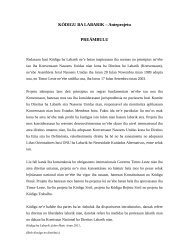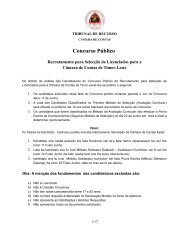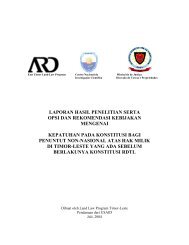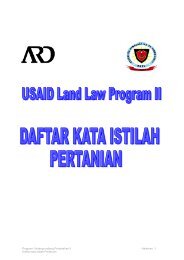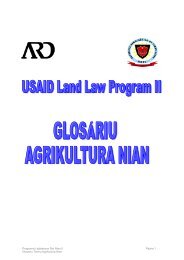English
English
English
Create successful ePaper yourself
Turn your PDF publications into a flip-book with our unique Google optimized e-Paper software.
3. REVIEW OF INTERNATIONAL<br />
AND COMPARATIVE<br />
LAW REGARDING PUBLIC<br />
INTEREST<br />
3.1 PUBLIC INTEREST UNDER INTERNATIONAL LAW<br />
The right to expropriate property is not absolute; international law places limitations on governments’<br />
discretionary powers in this regard. The 1962 United Nations General Assembly Resolution on<br />
Permanent Sovereignty over Natural Resources (GA Res. 1962: Paragraph 4) stated that expropriation<br />
“shall be based on grounds or reasons of public utility, security, or the national interest which are<br />
recognized as overriding purely individual or private interests, both domestic and foreign. In such cases<br />
the owner shall be paid appropriate compensation in accordance with the rules in force in the state taking<br />
such measures in the exercise of its sovereignty and in accordance with international law.” This resolution<br />
is closely connected to the principle of self-determination, and it is important to note that it characterizes<br />
expropriation as a right inherent in sovereignty. This means that expropriation is prima facie lawful,<br />
provided that individual acts of expropriation meet the conditions established by international law.<br />
In 1926, the Permanent Court of International Justice (PCIJ) took the position in the Upper Silesia case<br />
that “expropriation for reasons of public utility, judicial liquidation and similar measures” was lawful. In<br />
a case against the government of Sweden, the European Court of Human Rights (ECHR) stated that a fair<br />
balance must be struck between the demands of the general interest and the requirement that the<br />
individual’s fundamental rights be respected. In addition to these requirements, international case law<br />
suggests that lawful expropriation must not be discriminatory, in the sense of its being deliberately<br />
directed against land-holding nationals of only a single foreign country.<br />
3.2 PUBLIC INTEREST UNDER SOUTH AFRICAN AND COMPARATIVE<br />
CONSTITUTIONAL LAW<br />
South African law sets out more detailed criteria for the definition of “public interest” in the context of<br />
expropriation. Article 25 (2) of the South African Constitution allows for expropriation “for public<br />
purposes or in the public interest.” The term “public purposes” is usually defined in contrast to “private<br />
purposes.” It would cover an expropriation by the state for the purposes of carrying out its administrative<br />
obligations such as building a road, a bridge or a hospital. An expropriation undertaken specifically to<br />
benefit a private individual or to advance the state’s commercial ventures would serve “private,” not<br />
“public” purposes, and would therefore be inadmissible.<br />
The same would not necessarily hold, however, for expropriations involving transfer of land from one<br />
private party to another in cases of land reform. Where an expropriation is intended to benefit the public<br />
at large rather than a private individual, even though it effectively results in a benefit accruing to a<br />
particular individual (e.g., expropriation to redistribute land under a land reform program), the transaction<br />
would nevertheless still clearly meet the test of public interest, and would therefore be constitutional.<br />
Courts thus have only limited scope to set aside an expropriation on the grounds of its purpose and are<br />
NON-CUSTOMARY PRIMARY INDUSTRY LAND SURVEY 3



